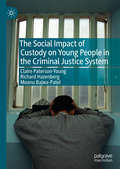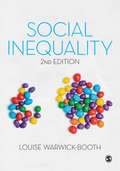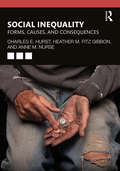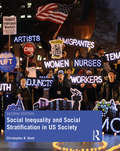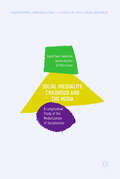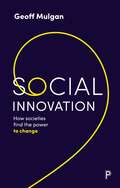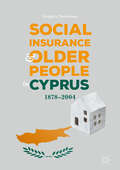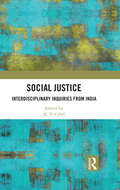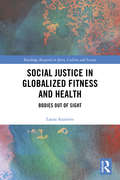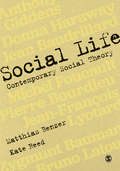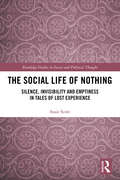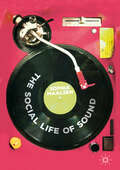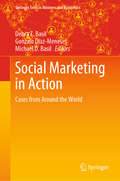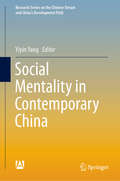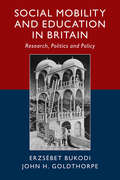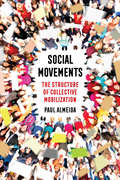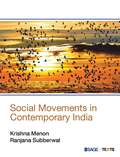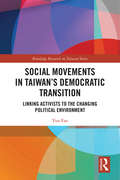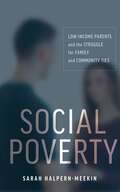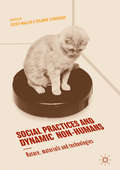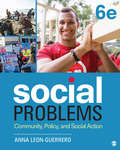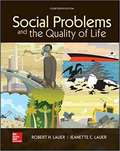- Table View
- List View
The Social Impact of Custody on Young People in the Criminal Justice System
by Claire Paterson-Young Richard Hazenberg Meanu Bajwa-PatelThis book explores the journey of young people through a Secure Training Centre and, more generally, the criminal justice system in the UK. It examines the extent to which young people have been failed by the system at every stage of their lives, with incarceration used as a means of removing ‘the problem’ from society. To explore this process, the authors utilise an integrated theoretical framework to develop a new rehabilitative approach focused on developing positive outcomes for young people. The book deploys a social impact measurement methodology to evaluate the experience and outcomes of youth justice interventions at a Secure Training Centre. Such an approach provides a fresh perspective on the youth justice debate which has traditionally utilised outcome data to measure immediate impact relating to recidivism and is therefore not focused on the young person holistically. Using a social impact framework to evaluate youth justice, underpinned by an integrated theoretical framework, allows for assessment to be made which place the young person at the centre of evaluation.
Social Inequality
by Dr Louise Warwick-BoothNow in an updated second edition, Social Inequality continues to be an essential guide to understanding social inequality and stratification, helping readers to understand what inequality is, how it is defined, explored and measured, and what the key social divisions are at both global and national level. The new edition includes updated coverage of sexuality and transgender issues, enhanced discussion of migration and asylum seeking, and further coverage of a global context for social inequalities, policy, and justice. The book also features two new chapters: Youth and Age, which discusses age as a social construct and form of division, the implications of ageing populations, ageism as a form of discrimination, and the different cultural understandings of age. Health and Disability, which defines health inequalities, outlines a range of global and national examples, and analyses the current thinkers on health inequalities and their proposed solutions. Suitable course reading for students on modules examining social justice, social policy, social class, and social inequalities.
Social Inequality: Forms, Causes, and Consequences
by Charles E. Hurst Heather M Fitz Gibbon Anne M NurseLike past editions, this tenth edition of Social Inequality: Forms, Causes, and Consequences is a user-friendly introduction to the study of social inequality. This book conveys the pervasiveness and extensiveness of social inequality in the United States within a comparative context, to show how inequality occurs, how it affects all of us, and what is being done about it. This edition benefits from a variety of changes that have significantly strengthened the text. The authors pay increased attention to disability, intersectionality, immigration, religion, and place. This edition also spotlights crime and the criminal justice system as well as health and the environment. The tenth edition includes a new chapter on policy alternatives and venues for social change.
Social Inequality
by Dr Louise Warwick-BoothNow in an updated second edition, Social Inequality continues to be an essential guide to understanding social inequality and stratification, helping readers to understand what inequality is, how it is defined, explored and measured, and what the key social divisions are at both global and national level. The new edition includes updated coverage of sexuality and transgender issues, enhanced discussion of migration and asylum seeking, and further coverage of a global context for social inequalities, policy, and justice. The book also features two new chapters: Youth and Age, which discusses age as a social construct and form of division, the implications of ageing populations, ageism as a form of discrimination, and the different cultural understandings of age. Health and Disability, which defines health inequalities, outlines a range of global and national examples, and analyses the current thinkers on health inequalities and their proposed solutions. Suitable course reading for students on modules examining social justice, social policy, social class, and social inequalities.
Social Inequality and Social Stratification in US Society
by Christopher B. DoobSocial Inequality and Social Stratification in US Society uses a historical and conceptual framework to explain social stratification and social inequality. The historical scope gives context to each issue discussed and allows the reader to understand how each topic has evolved over the course of American history. The author uses qualitative data to help explain socioeconomic issues and connect related topics. Each chapter examines major concepts, so readers can see how an individual’s success in stratified settings often relies heavily on their access to valued resources—types of capital which involve finances, schooling, social networking, and cultural competence. Analyzing the impact of capital types throughout the text helps map out the prospects for individuals, families, and also classes to maintain or alter their position in social-stratification systems.
Social Inequality, Childhood and the Media: A Longitudinal Study of the Mediatization of Socialisation (Transforming Communications – Studies in Cross-Media Research)
by Ingrid Paus-Hasebrink Jasmin Kulterer Philip SinnerThis open access book presents a qualitative longitudinal panel-study on child and adolescent socialisation in socially disadvantaged families. The study traces how children and their parents make sense of media within the context of their everyday life over twelve years (from 2005 to 2017) and provides a unique perspective on the role of different socialisation contexts, drawing on rich data from a broad range of qualitative methods. Using a theoretical framework and methodological approach that can be applied transnationally, it sheds light on the complex interplay of factors which shape children’s socialisation and media usage in multiple ways.
Social Innovation: How Societies Find the Power to Change
by Geoff MulganThe 21st century has brought a cornucopia of new knowledge and technologies. But there has been little progress in our ability to solve social problems using social innovation – the deliberate invention of new solutions to meet social needs - across the globe. Geoff Mulgan is a pioneer in the global field of social innovation. Building on his experience advising international governments, businesses and foundations, he explains how it provides answers to today’s global social, economic and sustainability issues. He argues for matching R&D in technology and science with a socially focused R&D and harnessing creative imagination on a larger scale than ever before. Weaving together history, ideas, policy and practice, he shows how social innovation is now coming of age, offering a comprehensive view of what can be done to solve the global social challenges we face.
Social Insurance and Older People in Cyprus: 1878–2004
by Gregory NeocleousThis book explores and analyses the evolution of social insurance in Cyprus from 1878, beginning with the arrival of the British after 300 years of Ottoman occupation. Neocleous follows the struggles of the labour movement which raised the issue of social insurance and initiated the campaign for its introduction in Cyprus. The book also evaluates the social conditions of the general population, with particular emphasis on older people, including a detailed study and analysis of their role and the movement for improved pensions. Taking into account historical sources, sociological theory, and anthropological concepts, this discourse is embedded within a rich historical framework, as well as an integration of the most contemporary scholarship in the field.
Social Justice: Interdisciplinary Inquiries from India
by K. V. CybilThis book explores the political and philosophical underpinnings of exclusion and social injustice in India. It examines social movements, anti-caste uprisings, reformers like Ambedkar and Narayana Guru and writers like Foucault and Serres to establish a link between the political and social milieu of the idea of nationhood. Going beyond the legal framework of justice, the essays in the volume reassemble the social from popular perception and the margins, and challenge Rawlsian and Eurocentric paradigms which have dominated discourse on social injustice. The volume also draws on instances of history as well as contemporary issues, as well as locating them in the context of social and post-colonial theory. An intellectually stimulating yet subaltern engagement with the idea of justice, the volume will be of great interest to scholars and researchers of social theory, law, modern South Asian history and social exclusion and discrimination studies.
Social Justice in Globalized Fitness and Health: Bodies Out of Sight (Routledge Research in Sport, Culture and Society)
by Laura AzzaritoIn today’s neoliberal times, thinking about fitness and health is dominated by the media’s narratives of "fit bodies," which are presented and circulated in society as "valued bodies." Outside that mainstream view, however, there are many people labeled "bodies-at-risk": those who deviate from perceived norms of size, shape, race, social class, and gender. Social Justice in Globalized Fitness and Health draws attention to how neoliberal ideologies impacting the body overlook the intersection of class, gender/sex, and race that informs how young, ethnic minoritized people embody and negotiate normative discourses of fitness and health. Indeed, through the lens of critical race theory (CRT), post-feminism, and postcolonialism, Azzarito highlights young, ethnic minoritized people’s struggles to find a culturally relevant sense of self. Arguing for the need to found educational spaces where young, ethnic minoritized people can recognize themselves, resist and counter-narrate negative stereotypes, and self-represent to the public in affirmative ways, Social Justice in Globalized Fitness and Health will appeal to students and researchers interested in fields such as physical culture, education, sport sociology, qualitative methods, and cultural and visual studies, as well as scholars and practitioners of physical education and health in schools.
Social Life: Contemporary Social Theory
by Kate Reed Matthias BenzerIn Social Life, the authors highlight, explain, and scrutinize socio-theoretical analyses of contemporary social relations and conditions - put forward by eight modern social theorists - and analyse how these have informed sociological inquiries into people’s lives in today’s social world. The book discusses the works of the following social theorists: Anthony Giddens Pierre Bourdieu Bruno Latour Donna Haraway Zygmunt Bauman Jean-Francois Lyotard Michel Foucault Jean Baudrillard In each chapter, the authors identify the key components of each theorist’s conception of society and apply the theories outlined to specific, modern phenomena. This connection with modern-day phenomena allows for a critical interrogation of issues in contemporary society, including: Inequality and Capital, Power, Fear and Terrorism, Immune System Discourse, Suffering, and Climate Change. Essential reading for all sociology students studying social theory and the works of modern social theorists.
Social Life: Contemporary Social Theory
by Kate Reed Matthias BenzerIn Social Life, the authors highlight, explain, and scrutinize socio-theoretical analyses of contemporary social relations and conditions - put forward by eight modern social theorists - and analyse how these have informed sociological inquiries into people’s lives in today’s social world. The book discusses the works of the following social theorists: Anthony Giddens Pierre Bourdieu Bruno Latour Donna Haraway Zygmunt Bauman Jean-Francois Lyotard Michel Foucault Jean Baudrillard In each chapter, the authors identify the key components of each theorist’s conception of society and apply the theories outlined to specific, modern phenomena. This connection with modern-day phenomena allows for a critical interrogation of issues in contemporary society, including: Inequality and Capital, Power, Fear and Terrorism, Immune System Discourse, Suffering, and Climate Change. Essential reading for all sociology students studying social theory and the works of modern social theorists.
The Social Life of Nothing: Silence, Invisibility and Emptiness in Tales of Lost Experience (Routledge Studies in Social and Political Thought)
by Susie ScottNothing really matters. All the things that we do not do, have or become in our lives can be important in shaping self-identity. From jobs turned down to great loves lost, secrets kept and truths untold, people missed and souls unborn, we understand ourselves through other, unlived lives that are imaginatively possible. This book explores the realm of negative social phenomena – no-things, no-bodies, non-events and no-where places – that lies behind the mirror of experience. Taking a symbolic interactionist perspective, the author argues that these objects are socially produced, emerging from and negotiated through our relationships with others. Nothing is interactively accomplished in two ways, through social acts of commission and omission. Existentialism and phenomenology encourage us to understand more deeply the subjective experience of nothing; this can be pursued through conscious meaning-making and reflexive self-awareness. The Social Life of Nothing is a thought-provoking book that will appeal to scholars across the social sciences, arts and humanities, but its message also resonates with the interested general reader.
The Social Life of Sound
by Sophia MaalsenThe Social Life of Sounds argues for the agency of sounds and music and the acceleration of their social lives in the Digital Age. Drawing upon research with composers, producers, record collectors, DJs and record labels, the book problematises the notion of artistic authorship as it is framed in Western systems of property. Acknowledging that ‘things’ – sounds, samples, and recorded music – and people are co-constituted and that personhood is distributed through things and their reuse, Maalsen makes a case for understanding sound as multibiographical and challenges the possessive individual that is the basis of artistic copyright.
Social Marketing in Action: Cases from Around the World (Springer Texts in Business and Economics)
by Debra Z. Basil Gonzalo Diaz-Meneses Michael D. BasilThis textbook provides students with real-world social marketing case studies from different countries and regions around the world, taking learners from classroom theory to practice. The primary objective is to clearly portray to students distinct, identifiable steps that are essential for successful social marketing campaigns. Core social marketing practices are applied to each case to help students master social marketing principles and apply them to their own real world social marketing activities in order to affect positive social change. This textbook first provides the tools necessary to understand the effective applica- tion of social marketing, and then offers 24 case studies exemplifying effective social marketing efforts from all around the world. Specifically, Part I clearly and concisely explains the principles of social marketing in five chapters: • Upstream vs. downstream social marketing, SWOT, competition • Fundamentals of social marketing, ethics • Formative and Evaluative Research • Theories applied in social marketing • A historical perspective on social marketing Part II features 24 social marketing case studies that demonstrate the application of social marketing principles. All 24 cases follow a consistent structure that includes: • Background • Positioning • SWOT • Research • Objectives • The 4 P’s • Target audience • Evaluation • Barriers and benefits • Discussion • Competition This format allows for students and professors to easily and effectively select individual cases and compare between cases. This textbook also allows instructors to encourage critical thinking by having students compare and contrast not only the cases themselves, but the applications used. In addition, teaching guides with answers to discussion questions, suggestions for activities inside and outside of the classroom and further readings are available to assist professors in teaching from this book.
Social Mentality in Contemporary China (Research Series on the Chinese Dream and China’s Development Path)
by Yiyin YangThis book not only seeks to theoretically analyze the concept, chief characteristics and framework of “social mentality”, but also explores the influence of social mentality on such elements of social functioning as individuals, groups, societies, markets and countries, and the influence of such elements as cultural, social, economic, political and mental factors on social mentality. Besides, this book discusses the structure of social mentality, tools for measuring it, and an indicator system. What’s more, it explores the role of the social mentality mechanism in the construction of harmonious societies.
Social Mobility and Education in Britain: Research, Politics and Policy
by Erzsébet Bukodi John H. GoldthorpeBuilding upon extensive research into modern British society, this book traces out trends in social mobility and their relation to educational inequalities, with surprising results. Contrary to what is widely supposed, Bukodi and Goldthorpe's findings show there has been no overall decline in social mobility – though downward mobility is tending to rise and upward mobility to fall – and Britain is not a distinctively low mobility society. However, the inequalities of mobility chances among individuals, in relation to their social origins, have not been reduced and remain in some respects extreme. Exposing the widespread misconceptions that prevail in political and policy circles, this book shows that educational policy alone cannot break the link between inequality of condition and inequality of opportunity. It will appeal to students, researchers, policy makers, and anyone interested in the issues surrounding social inequality, social mobility and education.
Social Movements: The Structure of Collective Mobilization
by Paul AlmeidaSocial Movements cleverly translates the art of collective action and mobilization by excluded groups to facilitate understanding social change from below. Students learn the core components of social movements, the theory and methods used to study them, and the conditions under which they can lead to political and social transformation. This fully class-tested book is the first to be organized along the lines of the major subfields of social movement scholarship—framing, movement emergence, recruitment, and outcomes—to provide comprehensive coverage in a single core text. Features include:use of real data collected in the U.S. and around the worldthe emphasis on student learning outcomescase studies that bring social movements to lifeexamples of cultural repertoires used by movements (flyers, pamphlets, event data on activist websites, illustrations by activist musicians) to mobilize a grouptopics such as immigrant rights, transnational movement for climate justice, Women's Marches, Fight for $15, Occupy Wall Street, Gun Violence, Black Lives Matter, and the mobilization of popular movements in the global South on issues of authoritarian rule and neoliberalism With this book, students deepen their understanding of movement dynamics, methods of investigation, and dominant theoretical perspectives, all while being challenged to consider their own place in relation to social movements.
Social Movements in Contemporary India
by Krishna Menon Ranjana SubberwalAn interdisciplinary text that offers a comprehensive understanding of social movements, their cause, course and effects in modern-day India. Contemporary India is experiencing widespread changes and developments in its society, polity and economy, resulting in a variety of social movements in recent years. This textbook offers an understanding of these movements, issues and discourses around them, and relates them to the wider society and resultant changes occurring within it. With a specific focus on India, the book delves into the concept and definition of social movements from different perspectives and offers a critical insight into the fundamental and ongoing debates and treatises around these movements. It covers discussion on a wide range of movements varying in locus and spatial spread - from environmental movements to disability, queer and women's rights movements as well as those by civil society, farmers, and marginalized sections of the society. Key Features: • Adopts an interdisciplinary approach to serve students of sociology, political science, history and other related disciplines • Provides a detailed treatment of civil society movements along with highlights on some landmark mobilizations • Draws on latest research and empirical studies; content aided by boxed features, review exercises and extensive referencing
Social Movements in Taiwan’s Democratic Transition: Linking Activists to the Changing Political Environment (Routledge Research on Taiwan Series)
by Yun FanExamining the relationships between activists and the changing political environment, this book analyzes the trajectories of three major social movements in Taiwan during the country’s democratic transition between 1980 and 2000. In doing so, it explores why the labor and environmental movements became less partisan, while the women’s movement became more so. Providing a comparative discussion of these critical social movements, this book explores key theoretical questions and presents a rich and comprehensive analysis of social activism during this period of Taiwan’s political history. It focuses on causal mechanisms and variation and thus avoids the tautological trap of finding an "improving" political opportunity structure wherever a social movement is flourishing. Drawing on extensive data from over 140 activists’ demographic backgrounds, the discussion also builds upon existing studies of the "biographical" aspects of contention. This study then asks further questions about how certain tactics are chosen, not only how a repertoire of contention comes to have the shape it does. Combining both a theoretical and an empirical approach, this book will be useful to students and scholars of Taiwanese politics and society, as well as social movements and democracy more generally.
Social Poverty: Low-Income Parents and the Struggle for Family and Community Ties
by Sarah Halpern-MeekinHow low-income people cope with the emotional dimensions of poverty Could a lack of close, meaningful social ties be a public—rather than just a private—problem? In Social Poverty, Sarah Halpern-Meekin provides a much-needed window into the nature of social ties among low-income, unmarried parents, highlighting their often-ignored forms of hardship. Drawing on in-depth interviews with thirty-one couples, collected during their participation in a government-sponsored relationship education program called Family Expectations, she brings unprecedented attention to the relational and emotional dimensions of socioeconomic disadvantage. Poverty scholars typically focus on the economic use value of social ties—for example, how relationships enable access to job leads, informal loans, or a spare bedroom.However, Halpern-Meekin introduces the important new concept of “social poverty,” identifying it not just as a derivative of economic poverty, but as its own condition, which also perpetuates poverty. Through a careful and nuanced analysis of the strengths and limitations of relationship classes, she shines a light on the fundamental place of core socioemotional needs in our lives. Engaging and compassionate, Social Poverty highlights a new direction for policy and poverty research that can enrich our understanding of disadvantaged families around the country.
Social Practices and Dynamic Non-Humans: Nature, Materials and Technologies
by Yolande Strengers Cecily MallerThe robots are coming! So too is the ‘age of automation’, the march of ‘invasive’ species, more intense natural disasters, and a potential cataclysm of other unprecedented events and phenomena of which we do not yet know, and cannot predict. This book is concerned with how to account for these non-humans and their effects within theories of social practice. In particular, this provocative collection tackles contemporary debates about the roles, relations and agencies of constantly changing, disruptive, intelligent or otherwise 'dynamic' non-humans, such as weather, animals and automated devices. In doing so contributors challenge and take forward existing understandings of dynamic non-humans in theories of social practice by reconsidering their potential roles in everyday life. The book will benefit sociology, geography, science and technology studies, and human- (and animal-) computer interaction design scholars seeking to make sense of the complex entanglement of non-human phenomena and things in the performance of social practices.
Social Problems: Community, Policy, and Social Action
by Dr. Anna Leon-GuerreroEmpower your students to become part of the solution. The new Sixth Edition of Anna Leon-Guerrero’s Social Problems: Community, Policy, and Social Action goes beyond the typical presentation of contemporary social problems and their consequences by emphasizing the importance and effectiveness of community involvement to achieve real solutions. With a clear and upbeat tone, this thought-provoking text challenges readers to see the social and structural forces that determine our social problems; to consider various policies and programs that attempt to address these problems; and to recognize and learn how they can be part of the solution to social problems in their own community. New to This Edition Many of the social policy discussions (including immigration, LGBTQ rights, the Affordable Care Act, and Internet neutrality) have been updated to reflect the most recent government actions and debates. More recent data, and new data sources, have been incorporated throughout, both in the main narrative and in the "Exploring Social Problems" features. New “Voices in the Community” subjects on gender, work and the economy, and war and terrorism appear in several chapters. New “In Focus” topics include Black Lives Matters, assault weapons, and college drug problems. The chapter on gender has been substantially updated with new or expanded coverage of binary/cisgender/transgender identification, gender nonconformity discrimination, sexual misconduct on college campuses, and the rights of trans and intersex individuals. Other new or expanded coverage elsewhere includes economic anxiety, robotization in the workplace, white nationalists, feminist theories about race, “fake” news, net neutrality, community policing, gentrification and segregation in U.S. cities, and the immigration and environmental policies of the Trump administration.
Social Problems: Community, Policy, and Social Action
by Dr. Anna Leon-GuerreroEmpower your students to become part of the solution. The new Sixth Edition of Anna Leon-Guerrero’s Social Problems: Community, Policy, and Social Action goes beyond the typical presentation of contemporary social problems and their consequences by emphasizing the importance and effectiveness of community involvement to achieve real solutions. With a clear and upbeat tone, this thought-provoking text challenges readers to see the social and structural forces that determine our social problems; to consider various policies and programs that attempt to address these problems; and to recognize and learn how they can be part of the solution to social problems in their own community. New to This Edition Many of the social policy discussions (including immigration, LGBTQ rights, the Affordable Care Act, and Internet neutrality) have been updated to reflect the most recent government actions and debates. More recent data, and new data sources, have been incorporated throughout, both in the main narrative and in the "Exploring Social Problems" features. New “Voices in the Community” subjects on gender, work and the economy, and war and terrorism appear in several chapters. New “In Focus” topics include Black Lives Matters, assault weapons, and college drug problems. The chapter on gender has been substantially updated with new or expanded coverage of binary/cisgender/transgender identification, gender nonconformity discrimination, sexual misconduct on college campuses, and the rights of trans and intersex individuals. Other new or expanded coverage elsewhere includes economic anxiety, robotization in the workplace, white nationalists, feminist theories about race, “fake” news, net neutrality, community policing, gentrification and segregation in U.S. cities, and the immigration and environmental policies of the Trump administration.
Social Problems And The Quality Of Life
by Robert H. LauerSocial Problems and the Quality of Life is a thought-provoking text providing thorough coverage of the social problems that most acutely impact the quality of our lives. Chapters define what a social problem is, and address a number of questions crucial to understanding social problems. Learning is supported through several pedagogical features such as Global Comparison boxes and public policy sections, as well as study questions, internet resources, and ample review materials. These sources all combine to paint a complete picture of how to understand the unique social problems of today’s world.
